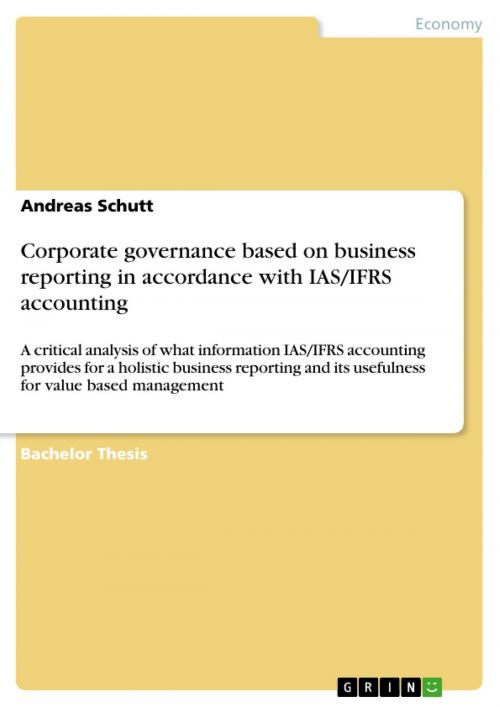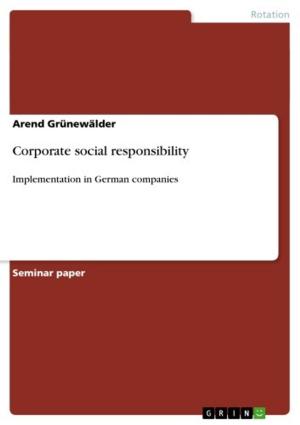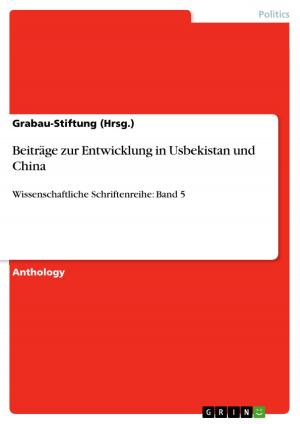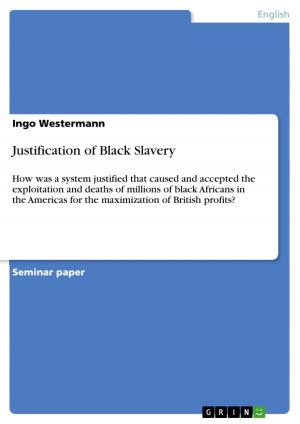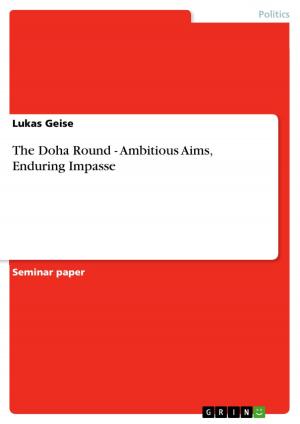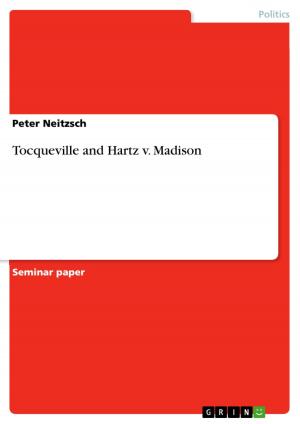Corporate governance based on business reporting in accordance with IAS/IFRS accounting
A critical analysis of what information IAS/IFRS accounting provides for a holistic business reporting and its usefulness for value based management
Business & Finance, Accounting| Author: | Andreas Schutt | ISBN: | 9783638053136 |
| Publisher: | GRIN Publishing | Publication: | May 27, 2008 |
| Imprint: | GRIN Publishing | Language: | English |
| Author: | Andreas Schutt |
| ISBN: | 9783638053136 |
| Publisher: | GRIN Publishing |
| Publication: | May 27, 2008 |
| Imprint: | GRIN Publishing |
| Language: | English |
Bachelor Thesis from the year 2006 in the subject Business economics - Accounting and Taxes, grade: 1,7, University of Applied Sciences Essen, 127 entries in the bibliography, language: English, abstract: In recent years standard setting bodies as well as users such as capital markets have increased their demands for developing external reporting towards a HBR (HBR). Along with the requirement that listed companies located in Europe as of 1st January 2005 should prepare their consolidated financial statement in accordance with International Accounting Standards (IAS), more and more companies all over the world (freely or by obligation) are preparing and publishing their consolidated accounts applying International Financial Reporting Standards (IFRS). Using international accounting systems like IAS / IFRS with its central principle of 'decision usefulness' makes it possible respectively obligatory to meet the information needs of a HBR by ' ... reducing the information asymmetry between providers and recipients of capital ... ' . 'To be relevant to investors, creditors, and other for investment, credit and similar decision, [IAS / IFRS] accounting information must be capable of making difference in a decision by helping users to form predictions about the outcomes of past, present, and future events or to confirm correct expectations.' By calling for 'decision useful' information within IAS / IFRS accounting one could ask why the collected information is only used for external business reporting. With its holistic approach, business reporting and its underlying informative basis determined by the principles and rules from IAS / IFRS provides the opportunity to use it as an internal control system in order to support managerial decisions as well. Or, to see it from a different angle, if 'decision useful' information to prepare IAS / IFRS consolidated accounts are already gathered, it is to be questioned how CG can use them within the decision-making processes. Hence, the main goal of this elaboration is to figure out to what degree and how CG can benefit from 'decision useful' information that holistic business reporting in accordance with IAS / IFRS holds. Therefore the present thesis, as the title already suggests, primarily deals with the analysis of (1st) what information HBR on the basis of IAS / IFRS accounting provides and (2nd) to what extent information from holistic business reporting is useful for corporate governance. Finally, this thesis will draw a conclusion on the analysis whether CG can be based on holistic business reporting in accordance with IAS / IFRS accounting and summarize its new insights in the topics of CG and HBR.
Bachelor Thesis from the year 2006 in the subject Business economics - Accounting and Taxes, grade: 1,7, University of Applied Sciences Essen, 127 entries in the bibliography, language: English, abstract: In recent years standard setting bodies as well as users such as capital markets have increased their demands for developing external reporting towards a HBR (HBR). Along with the requirement that listed companies located in Europe as of 1st January 2005 should prepare their consolidated financial statement in accordance with International Accounting Standards (IAS), more and more companies all over the world (freely or by obligation) are preparing and publishing their consolidated accounts applying International Financial Reporting Standards (IFRS). Using international accounting systems like IAS / IFRS with its central principle of 'decision usefulness' makes it possible respectively obligatory to meet the information needs of a HBR by ' ... reducing the information asymmetry between providers and recipients of capital ... ' . 'To be relevant to investors, creditors, and other for investment, credit and similar decision, [IAS / IFRS] accounting information must be capable of making difference in a decision by helping users to form predictions about the outcomes of past, present, and future events or to confirm correct expectations.' By calling for 'decision useful' information within IAS / IFRS accounting one could ask why the collected information is only used for external business reporting. With its holistic approach, business reporting and its underlying informative basis determined by the principles and rules from IAS / IFRS provides the opportunity to use it as an internal control system in order to support managerial decisions as well. Or, to see it from a different angle, if 'decision useful' information to prepare IAS / IFRS consolidated accounts are already gathered, it is to be questioned how CG can use them within the decision-making processes. Hence, the main goal of this elaboration is to figure out to what degree and how CG can benefit from 'decision useful' information that holistic business reporting in accordance with IAS / IFRS holds. Therefore the present thesis, as the title already suggests, primarily deals with the analysis of (1st) what information HBR on the basis of IAS / IFRS accounting provides and (2nd) to what extent information from holistic business reporting is useful for corporate governance. Finally, this thesis will draw a conclusion on the analysis whether CG can be based on holistic business reporting in accordance with IAS / IFRS accounting and summarize its new insights in the topics of CG and HBR.
